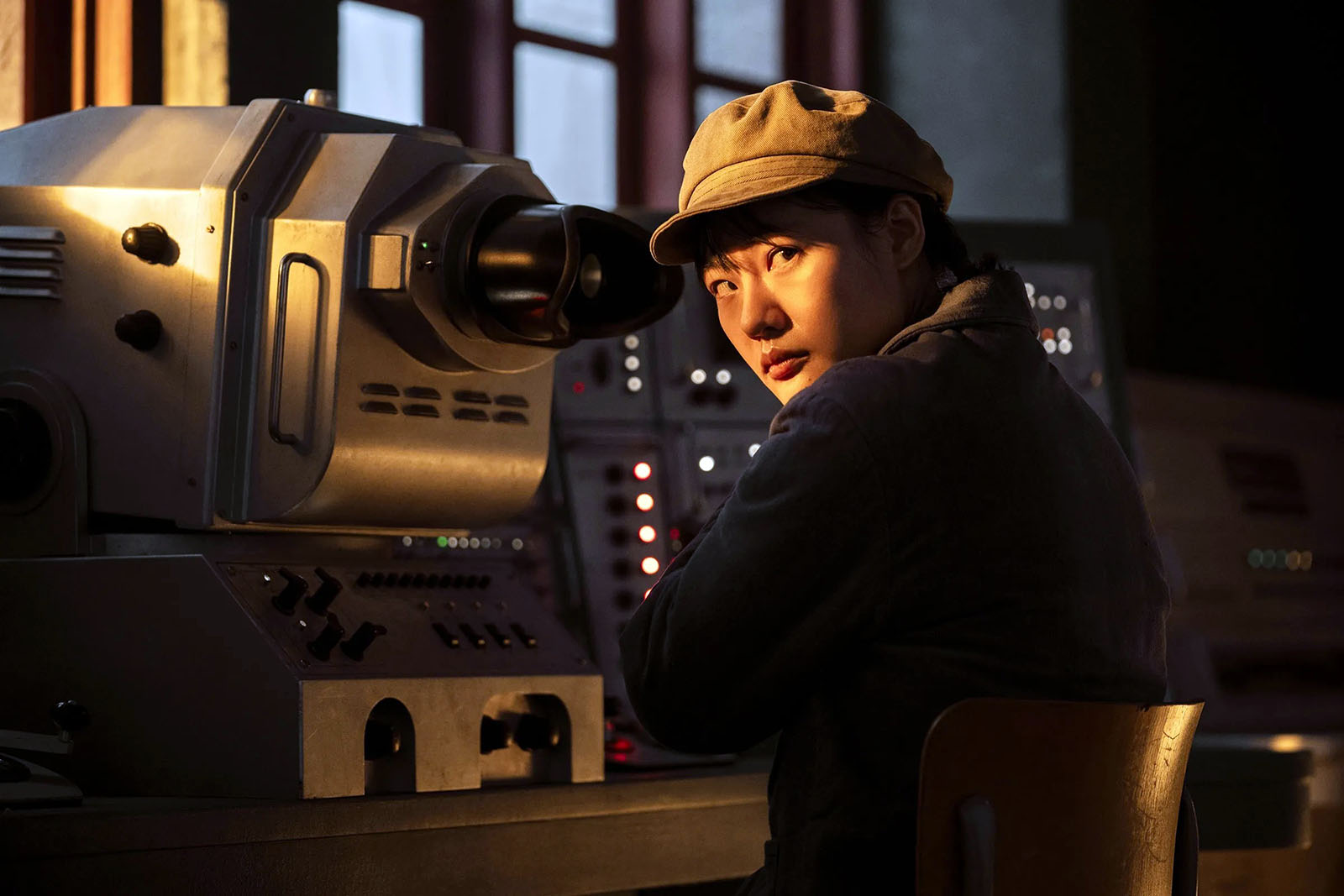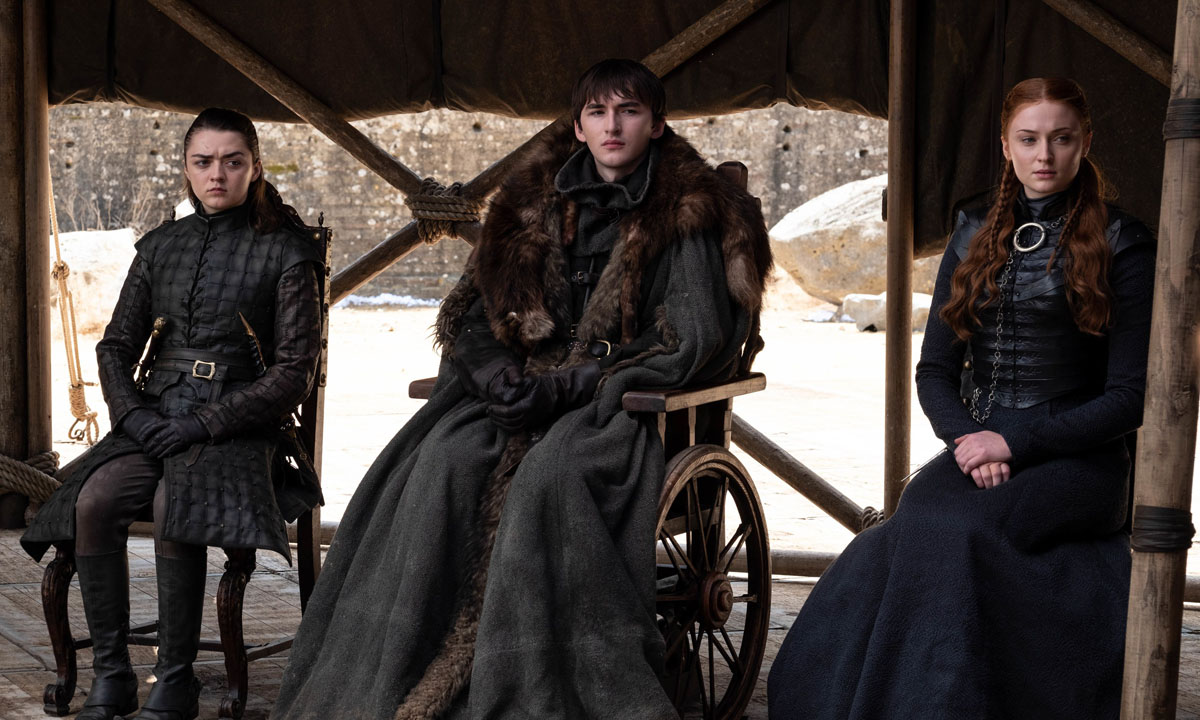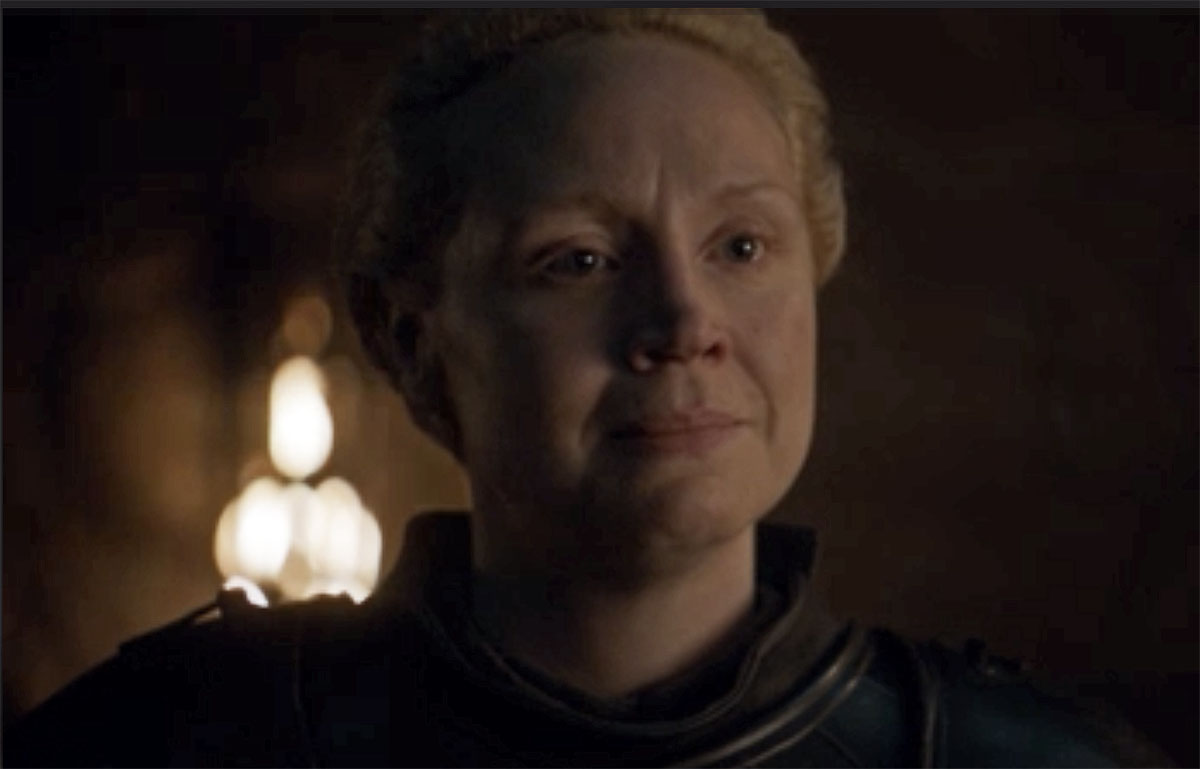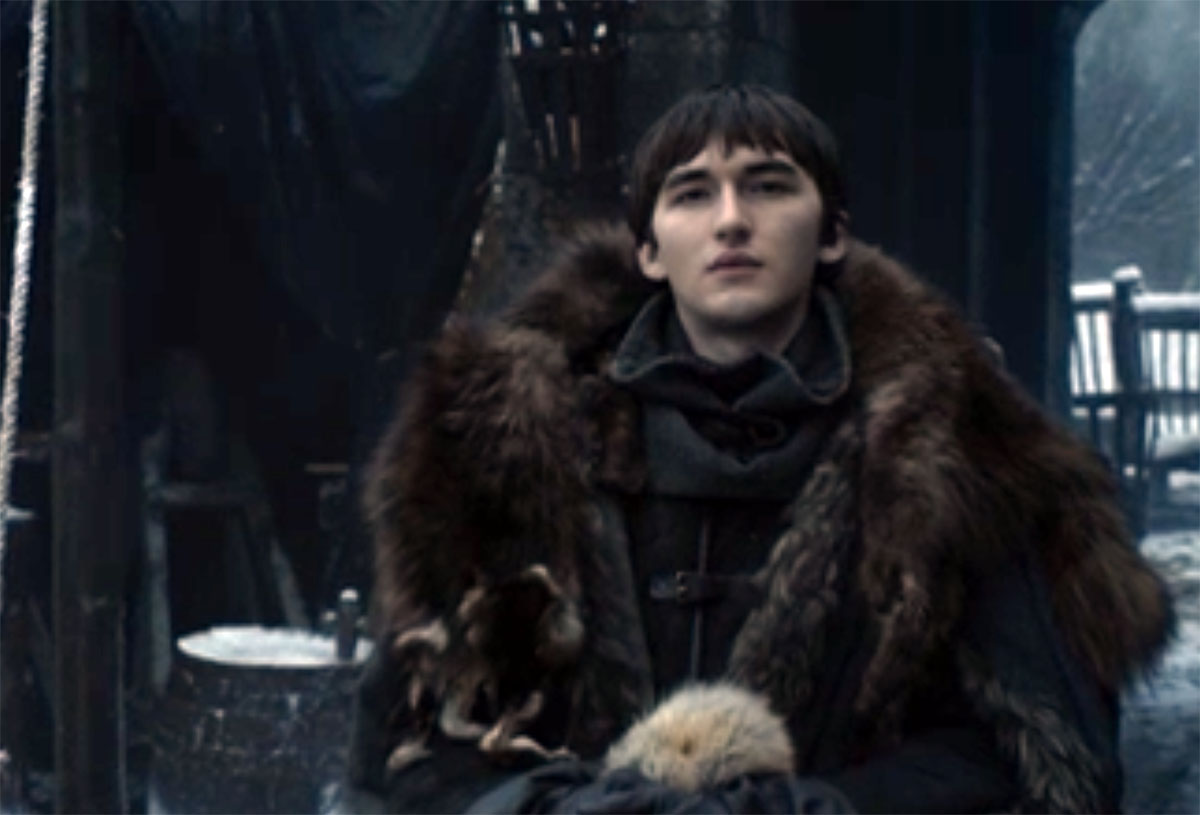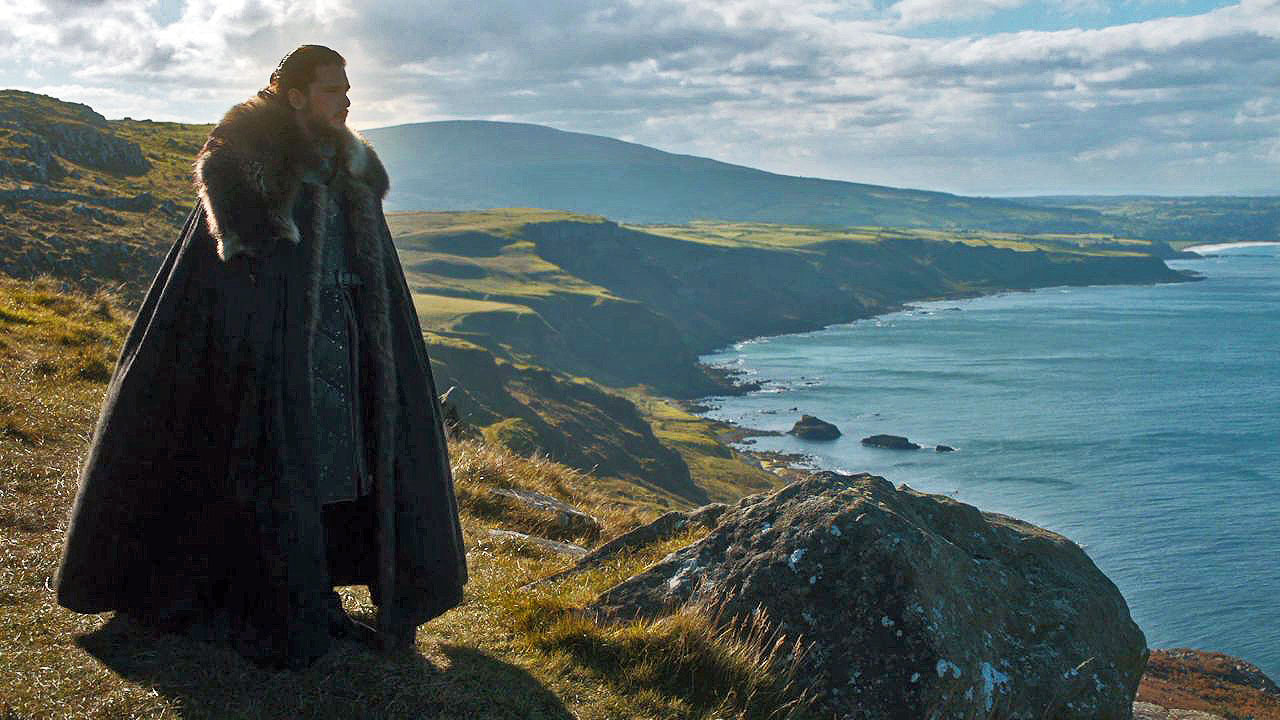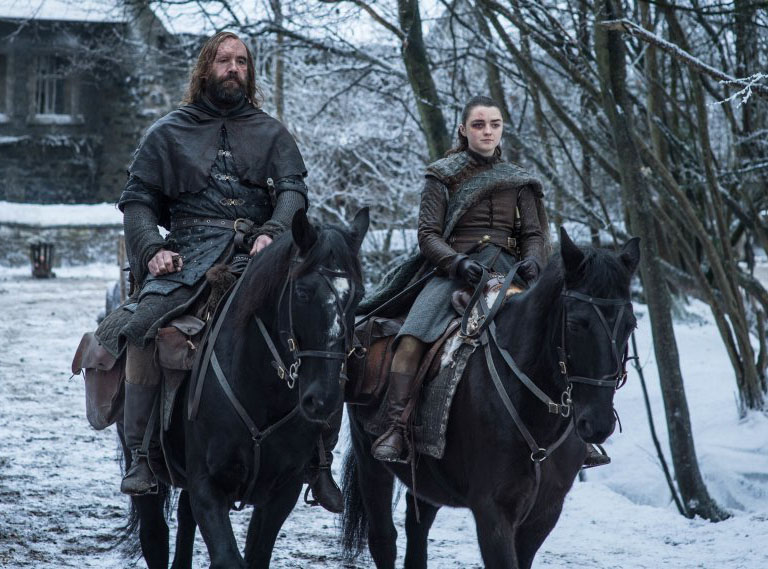
Ken Ilgunas and David Dalton are reviewing each episode of the final season of Game of Thrones. Check the “Game of Thrones” category to list all of these posts.
David:
Mornin’, Ken…
This beautiful episode reminds us that in spite of Game of Thrones’ achievements in world-building, plot-spinning, and politicking, it’s the characters that really matter. We got quality time with all of our favorite characters — those who remain alive, anyway — as they tried to wring some moments of fire-lit happiness out of the temporary peace. Even so, most of their hearts were broken by the end of the episode, which is of course what must happen in a story, if any are to end up permanently happy when the final curtain comes down.
With the death of Missandei, I don’t expect many more deaths (other than villains) in the last two episodes. Two or three more deaths of characters we love will be required to clear a path to the throne, in acts of violent payback and acts of self-sacrifice. But I think (or hope, anyway) that having brought the remaining characters this far, there will be no more deaths hereafter other than deaths that are strictly necessary to the plot.
At last we are focusing on the endgame of who will get the throne. The candidates are (or seem to be) Jon, Daenerys, and Cersei. Still, even with all the war and politics involved, the question of the throne comes down to relationships and character. Martin’s long investment in rich characters is paying a wealth of dividends as we approach the end. Viewers are being invited to take sides: Whom do we want to end up on the throne? After a long dry spell of Tyrion-Varys scheming, much of the analysis is done for us, and I can’t say that I disagree with it. Is Varys contemplating assassination?
As the end-plot unfolds, I think it’s useful to look at the motivations of the key characters to make predictions about who will do what. Grey Worm now requires atonement for the murder of Missandei. Arya and the Hound are probably on the way to to King’s Landing. Cersei, of course, is still on Arya’s list. The Hound is just the right person to kill Gregor Clegane, his monster brother (probably with some fire involved). Though Jaime gave us to believe that he was returning to King’s Landing to protect Cersei, he could just as easily kill her. Though Brienne (poor Brienne!) has a duty to protect Sansa, love will surely bring her back into the action (and, I hope, for a reunion with Jaime). Podrick will go with her. I’m guessing that Sam is out of the action now, and the wildlings, too. Gendry is now indebted to Daenerys and must join the action. Yara has dibs on killing Euron (slowly, one hopes). The awful Qyburn must die. As for who kills Qyburn, I can’t think of a better death for him than some contraption or creation of his own backfiring on him. Bronn will kill somebody; I just hope that it’s a villain. I’m afraid that we may lose Varys, not only because he is contemplating treason but also because his loyalty to the little people will demand a sacrifice. If Varys does die, we can expect him to make his death count. Bran seems superfluous at this point, yet surely he has a remaining part to play. With Sansa and Bran at Winterfell, the story must return there before the end. Daenerys is in a rage. That bodes ill for her future, because Daenerys is not a nice person when she’s in a rage.
The plot is now congealing. Like buttermilk being churned, with the small lumps of butter coming together into larger and larger lumps, the possible number of outcomes are now rapidly being reduced. And yet there is plenty of room to shock us and surprise us in the final episode.
Two mysteries: Is Cersei really pregnant by Euron, or is she only lying to him to motivate him? That will matter to Jaime. Tyrion asked Jaime about Brienne’s genitals. When Brienne unbuttoned her shirt, the camera turned away. There are three options, I suppose: that she is fully a woman; that her gender is ambiguous and intersex; or that she is physically male. I have no idea which. But we’re assured that it will be revealed. Brienne is the purest soul in the entire cast of characters. She is a Joan of Arc, living according to her inner lights and suffering because of her differences. That it should be so is a mark of George R.R. Martin’s genius. In all of literature, only the Arthur story can compete with Martin’s cast of characters.
Ken:
Morning David.
Last season ended with snowflakes falling over King’s Landing. Yet, in this episode, it looked like a warm day outside the walls of the capital, didn’t it? Winterfell didn’t look too winterly itself. Apparently, whether it’s White Walkers or winter, it doesn’t matter too much if they’re coming.
The show has invested for years in its characters, as you say, and it almost doesn’t matter if there a few glaring plot holes, so long as we get to follow them to their destinations for a few more hours.
I do think the series has mostly lost me, but this wasn’t a bad episode. It was fun to see some clever banter between Tyrion and Varys, and the political situation (for Dany especially) does indeed seem complicated and hard to predict. Stray thoughts…
– For having just faced about a million zombies, there was, in Winterfell, 1) remarkably little reflection on what the hell just happened, and 2) a remarkable number of survivors. I’m craving some Night King closure. And half the Unsullied survived?! At the end of the last battle, the zombies had overrun everything and the only survivors left were our favorite heroes with their backs against the wall. Also, where are all these hot northern women coming from? The north, by now, should be covered in a glacier embedded with a million rotting bodies, and the people should be suffering from famine, fatigue, and disease. Instead, Dany still has half of her resources and everyone’s shacking up in Winterfell.
– What is the point of Bran? For all his powers of warging and time-travel, he’s become a rather impotent character. What has he accomplished apart from a few reconnaissance missions and figuring out Jon’s parentage?
– Are the knights of the Vale still sitting out all the important battles?
– I would have preferred that Jaime and Brienne never have consummated their love with a sexual act. Theirs seemed to be a rare and special bond, one forged by admiration and a deeper, more complicated variety of love. Jaime was reborn in a way because of Brienne, whose purity of soul made him realize that some inner part of him still clung to the ideal of living a life of honor. And now they have some unprotected sex and Jaime leaves halfway through the night? Brienne deserves erotic love, too, but I would have liked the show to have celebrated a rare form of love (just as there have been rare sorts of characters to be loved), rather than just throwing two more characters in the sack together. It sort of cheapens something distinct.
– I take it that Jaime is still conflicted about what to do with his sister. The only sensible thing his character can do, now that he’s ever more soaking up the purity of Brienne, is to kill his sister.
– Varys does seem to be contemplating assassination! This is an interesting development, and it works because everyone is being true to their character and their character’s motivations.
– Our favorite commenter, Josh, once predicted that Dany’s purpose is to “break the wheel” of the constantly warring kingdoms in order to end the very idea of kingdoms. In this theory, perhaps Dany could do for Westeros what Charlemagne did with the many little kingdoms of Germany and France, which is to weaken all these little kingdoms to the point of obsolescence and unify them to form the one great Dark Age empire, the Carolingian Empire. However, Dany’s award of Storm’s End to Gendry seems to be a continuation of this old style of government, perhaps ruining this “wheel-breaking” theory. Maybe so, but I’d still love to see her final dragon melt the Iron Throne.
– How does this end? Dany has fewer and fewer allies. Will Westeros be the Carolingian empire or Brexit?
– Jon is acting as admirably as he can, though I’m not sure why he felt so compelled to tell his sisters the truth about himself. Ned Stark kept Jon’s genetics a secret for decades. Why can’t Jon?
– There’s no way Cersei has been impregnated by Euron. You’ll remember that she claimed she was pregnant well before she met Euron. (There’s the chance she’s been faking it all along, of course.) In any case, Euron should be wondering how Tyrion knew of Cersei’s pregnancy. This display of accidental knowledge could perhaps create some tension in the King’s Landing royal bedroom.
– Interesting theory about Brienne as a possible intersex character. If you watch the one scene where she gets naked in the hottub with Jaime (in season three, I believe), the camera cleverly left her body parts concealed, and I do recall a surprised look on Jaime’s face. https://www.youtube.com/watch?v=rBb3Q8VdYas
– You’re a big Brienne fan. What would you have done with the Jaime/Brienne bond? Also, remind me to go on my rant about “Chekov’s gun.”
Update 1:
David:
I can agree with you that the transition from battle to drinking and shacking up was a bit abrupt. But we did have the pyre scenes for grieving and for properly paying respect to the dead. Life goes on — and in filmmaking I suppose it must go on a little more quickly than in books. But, as we’ve discussed before, I am all too eager to suspend disbelief and to accept what I’m shown without too much question (especially if I love the characters as much as I love the Game of Thrones characters).
The question you raise about Brienne’s purity and the consummation (I really dislike that loaded word) of the Jaime-Brienne relationship is worth some disputation. I must ask if you might be seeing their love through an Augustinian lens, a lens that very much informed the ethic of what I call the romantic myth, and the Arthur story. It’s an extremely weird lens, though our culture has internalized it and normalized it. In the Augustinian ethic, purity is a very high (and a very conservative) value. In that ethic, sex is a great defiler of purity. The right people get to do it, and their doing it is glorified and romanticized and celebrated. But others are forbidden to do it, and their doing it is condemned as wrong and shameful, and even unnatural. But the Augustinian lens is not the only lens, though it took over the world after Rome. There still exists a pagan lens, a kind of classical lens, the shreds of which survived the destruction of the classical world.
What kind of world is the Game of Thrones world, where sexual ethics are concerned? I was amused by what one of your readers on Facebook said about Game of Thrones: “Watching society approved PORNOGRAPHY and graphic violence? No Thanks. I think it also says alot about society where incest and other taboos are portrayed and enjoyed on a high ranking show. SMH.” Many people have been offended by sexual behaviors on Game of Thrones. Do you really want to join them? (I recognize that you’re not offended, that what you’re expressing is disappointment in an element of the story.)
You acknowledge that Brienne deserves erotic love, too. I would even say that she deserves it more than any other character. If she is so deserving, then would it be fair for us to want to withhold it from her or to expect her to sublimate it for some value that we regard as higher? Far from cheapening the relationship, I think that Jaime’s seduction of Brienne ennobled the relationship — and ennobled Jaime along with it. Jaime loves Brienne, though, having eyes only for Cersei, he does not seem to be in love with Brienne. Maybe Jaime saw that, regardless of where his destiny might take him next, knowing that Brienne was a virgin and that she loves him, and given that lots of people around them were getting laid, this night was Brienne’s night. Fundamental fairness demanded it. It was a wrongness to be righted. Jaime understood that fate had assigned him to give this gift to Brienne and to right the wrong. There exists an ethic in which honor requires it, rather than advises against it. Not that it was a chore, I’m guessing. One of my hopes, when the ending comes, is that Jaime and Brienne end up together, as unlikely as that seems.
Since I just ranted, please rant about Chekov’s gun!
Update 2:
Ken:
In regard to the Brienne and Jaime night together, you make good points! If there is indeed admiration, desire, and attraction, then sure, go for it… I suppose I’d thought their love for one another was of a completely different sort that didn’t involve the erotic. And we, as the audience of a mainstream show, so seldom get to see unconventional sorts of love (between same-age male and female characters) in our shows, films, and books. There’s part of me that didn’t want this rare relationship to stray into conventional romantic territory (and the woman crying after the man departs the bedroom early is indeed a romantic trope).
I don’t think my criticism comes from a place of prudishness or from an Augustinian perspective. (I’m not one to cover my eyes when there’s nudity.) I merely hoped that the show, which pairs naked people together willy nilly, would celebrate and preserve a different kind of love without putting the two of them in bed together. Surely non-sexual and platonic relationships must have existed in pre-Roman times. If it was in Brienne’s character all along to want this, then my interpretation was simply wrong.
On a high-altitude note, I’d argue that we don’t always need to give our characters what they need. When we send them off on their own in two weeks, when the show ends, we need to give our characters new quests and unsatisfied desires that they’ll seek in the afterlife of the show. We can’t just have them all settle into a warm bath, which would have been the case if Arya partnered up with Gendry.
Okay, my Chekov’s gun rant, which I generously borrow from Jeva Lange’s recent piece for The Week.
Lange introduces a nice principle: the “Chekov’s gun” principle. Chekov reportedly said, If in the first act you have hung a pistol on the wall, then in the following one it should be fired. Otherwise don’t put it there.
There are too many Chekov guns in GoT. The Valyrian steel barely played a role. Same with the dragon glass. Or what about the Night King’s swirly symbol, which the whole series began with? Lange points out how the Wall (which had magical spells in it, according to a previous episode) is another. Bran’s whole character may be a Chekov’s gun. (It’s not at all clear to me why Bran is so important, especially after he relayed Jon Snow’s secret.) Isn’t “Winter is coming” a Chekov’s gun, too?
I almost feel like Chekov’s gun is a good metaphor for the whole show. You have characters like Beric and Theon and Jorah go on these long complex story arcs that could end in the most poignant ways that somehow “complete” their stories, but these arcs all end in symbolically-impoverished ways, and the only reason we feel something (and we definitely feel something) is that we love and have been with these characters for ten years.
Beric is brought back from the dead twenty times. Jorah is a slave-trader, then a slave, then an infected greyscale patient. Theon goes from hothead, to Iron Islander, to killer, to… You get the rest. These are amazing character arcs and their deaths should somehow complete their stories. Rather, the writers just randomly threw out some sorta-tragic sacrificial endings for these characters hoping they’d accidentally nail it.
Bran saying “You’re a good man” before Theon’s last run with a spear isn’t good enough to tie up Theon’s whole story. I’d almost rather he die in futility, maybe in the middle of battle, by friendly fire, or something random. Because then the story at least has something to say about futility and randomness and it would throw the whole end of the show into question again: Is Martin a nihilist and is this going to end the worst possible way? That’s horrible for Theon’s arc, but it would have done amazing things for the show, the same way Ned Stark’s death did. Same with the Red Wedding.
Instead, we get our heroes dying the way heroes have died in a thousand stories, like Jorah dying beside his beloved queen. It’s not a terrible ending, but it’s not the right ending. It’s just like the writers looked back and asked, “Well what death makes most sense for Jorah given where he’s come from?” rather than having it all preplanned.
The moment when Hodor dies holding the door was one of the most amazing moments in the series. The meaning behind the character’s name was decided practically before the first books were written. That moment is so special, not just because we lose a character; it’s special because we’re witnessing an amazing, beautiful, one of a kind storyteller create something so complex and beautiful and perfect. We got none of that in the battle episode, and I’m not sure we’re going to see it again for the rest of the series.
Update 3:
David:
I think you are quite right about Chekov’s gun. It seems I’m always making excuses for HBO, but…
Maybe the presence of too many Chekov’s guns is a consequence of making the series one season at a time, with future seasons unwritten and incompletely planned before production began. In book writing, it’s easy enough to make a single volume consistent with itself, just by going back and editing in fixes after you reach the end. But it’s a much bigger problem to preserve continuity with as-yet unwritten future volumes, unless everything is planned out in advance to the last detail. Martin’s troubles, and delays, with the last two volumes suggest that he did not have everything planned out. If that’s the case, then he had to put in foreshadowings that he thought he might need, even if ultimately he didn’t use them and they ended up as Chekov’s guns. Probably both Martin and HBO are guilty of this.
The way to do it right is the way Tolkien did it — write all of it before the first word is published. Even so, after the first edition, Tolkien made changes and corrections as the letters came in from readers pointing out inconsistencies and continuity problems.
I can forgive an awful lot of imperfection. Games of Thrones was a huge, huge project.
Update 4:
Ken:
I agree that Tolkien’s process is the way to do it. But I’m guessing GoT will in the end be something like eight times the length of Lord of the Rings. Is a story as big as GoT (told properly) even possible to accomplish by one person? And do we have examples of other people competently taking over for the original writer when he or she passes? If Martin wrote all seven books at once, then that sounds like an almost thirty year project. No publisher will ever give an advance to an author that would cover thirty years of living, so writers simply are unable, economically, to pull something like this off. You have to publish them piecemeal to make money and survive.
I think the GoT TV series had a tight, interwoven story line for the first six seasons, when they were relying mostly on Martin’s old material. Things began to fall apart in Season Seven, when the dialogue sparkled less, when the political decisions got dumber, when key characters were being conveniently resurrected from the dead… We keep watching these last two seasons simply because we love the characters and because we’re hoping it’ll all fit together in the end, and I’m arguing that it already isn’t fitting together.
Questions… You have written two, going on three, sci-fi books that are part of a trilogy, but you are publishing them piecemeal. Do you wish you waited to finish the trilogy first, so that you could have developed long, rich, and wickedly complex narrative arcs? (Not to say that yours aren’t, but you know what I’m saying…) Is creating a super long and elaborate series like GoT (or at least the GoT we really want) humanly possible? Do you think we’ll see another story that’s as long as (and perhaps more complete) GoT in our lifetimes? How do you think GoT will be remembered in thirty years? Is there any possibility they’ll do a remake in thirty years when they have more material from Martin? Or is the problem with Martin, who may have bitten off more than he can chew?
David:
I am still unwilling to use language as strong as “fall apart.” I actually thought that the dialogue in Season 7 was quite good, partly because of the superb and sparing use of English. But I agree that, once HBO outran Martin’s books, trouble was bound to happen. That outrunning never should have occurred. The reason, I assume, is that Martin missed his deadlines. Still, what Martin is doing is not something that can be rushed.
My own novels: Absolutely. I would love to be able to revise Fugue in Ursa Major (book 1 of the series) to align everything better — including the quality of the writing — with Oratorio in Ursa Major (book 2). But once a book is out the door, you can’t take it back. Still, I had done enough planning to know where things were going, and I think that I got the foreshadowing at least approximately right. As you no doubt are pointing out, to write and release the books of a series piecemeal is a dangerous process, and some things — small things, one hopes — are bound to go wrong, or at least could have been done better.
Maybe this is one reason why I am so forgiving of HBO and Martin. Perfection in a work of fiction is simply too much to ask for. If you asked me to name a perfect work of science fiction — my preferred genre — I believe that the only book that I would be able to name would be Frank Herbert’s Dune, and maybe Orson Scott Card’s Ender’s Game. And yet book two of the Dune series was so full of flaws that I lost interest and stopped reading it. The followup books of the Ender series also were weak. Isaac Asimov’s Foundation series is extremely good and is of consistent quality through the series. But it is hardly without flaws. At the moment I am trying to read Brian Aldiss’ White Mars, which Aldiss co-wrote with Roger Penrose, whom I regard as the greatest living physicist. But White Mars is an embarrassingly terrible novel, Aldiss’ reputation notwithstanding. Still, I will soldier on because I want to know how Penrose’s ideas shaped the novel, because I believe that Penrose is willing to say in fiction what he dare not say (but suspects) as a physicist.
One of the sad things about getting older and having spent one’s life reading fiction is that it gets more and more difficult to find novels that are fully mesmerizing and that sweep you away the same way you were swept away as a young person. The first three books of Martin’s Game of Thrones series did that for me. But book 4 (I know that you don’t agree with me on this) began to meander, in my opinion, and started to preen on the sound of its own words. Even if you like book 4 of the Game of Thrones series, I’d still argue that such a change of style and narrative mid-series is wrong. My suspicion (and, again, I know that you don’t agree with me on this, and I respect that) was that Martin started padding his writing in book 4 to make two books (and more money) out of what should have been one book.
But my bottom line here is that, if I didn’t forgive fiction writers for their sins and shortcomings, then I’d have next to nothing to read and would therefore live in a state of existential poverty.
All the questions you raise about Martin and Game of Thrones in your last paragraph above are extremely good questions. I think that the only response I’ll venture for now is that the Game of Thrones series already is a classic in the same category as Tolkien’s Lord of the Rings. If Martin’s final two books diverge significantly from HBO’s version, then I will long for a remake sometime in my lifetime. Though Peter Dinklage is an American (and has the flawed princely accent to prove it), the GoT series deserves a future remake just to give a fresh set of those incredible British and Irish actors a chance to shine. Like you, I identify with writers (who are under-appreciated) more than actors (who get all the glamour and glory). But the ability of those islands to produce such brilliant actors and actresses and to astonish us with what the English language can do — that’s some kind of miracle, above and beyond the miracle of writing the story in the first place.
